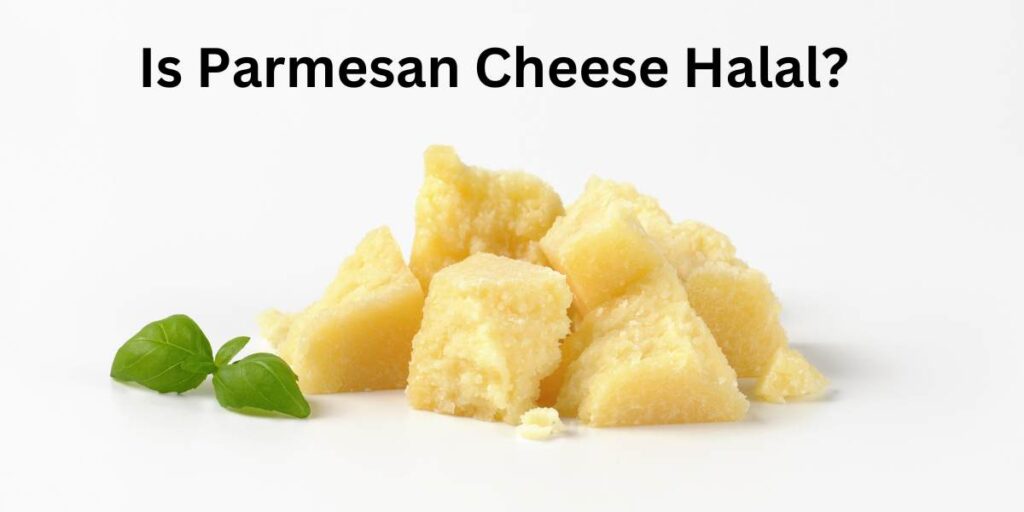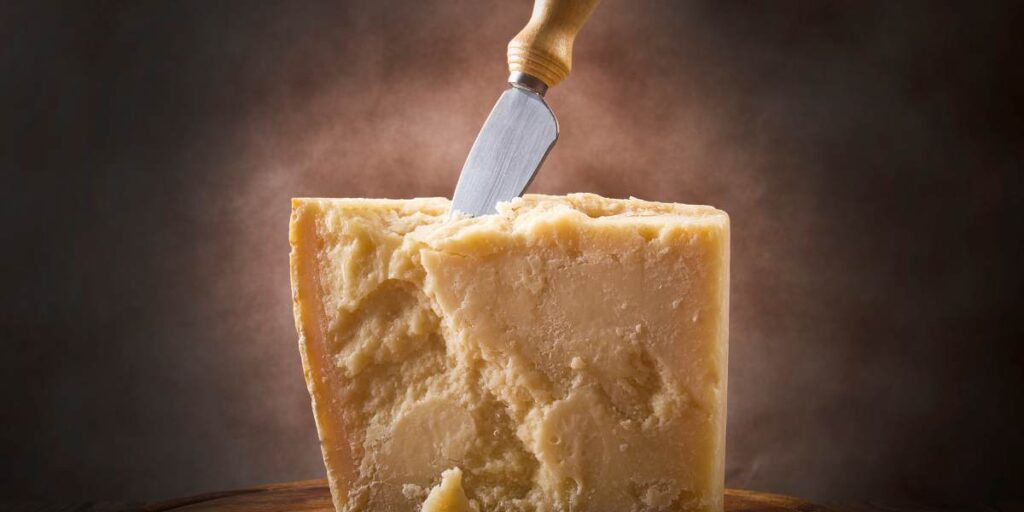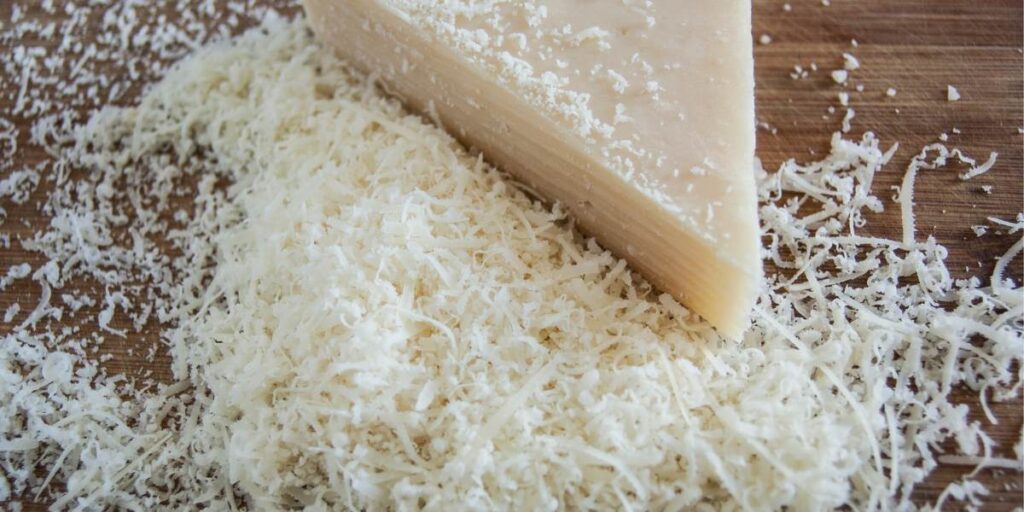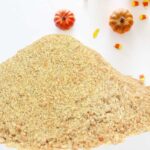Parmesan cheese from a specific region in Italy called Parmigiano-Reggiano may be haram due to animal rennet. Some cheeses, similar to Parmesan, use plant-based rennet, which may be halal. Parm aficionados enjoy this salty dairy product with low lactose levels, but checking its halal status is essential. Fun facts include its long aging and widespread use in cooking.
Is Parmesan Cheese Halal and Haram?
Parmesan Cheese can be haram if made with rennet from mammals. Some cheese producers now use microbial rennet to make it halal.
Muslim people can safely enjoy Parmesan by checking the labels. Cello Cheese offers vegetarian—and vegan-friendly options. Changing times have provided more choices for those with diet restrictions.

Types of Parmesan Cheese
Parmesan cheese has various types based on the aging process and regions like Parma and Reggio Emilia in Italy. It is a hard cheese made from cow’s milk, with flavor and texture changing as it ages. Parmigiano-Reggiano is the most well-known and usually lasts for at least 12 months. Some are 24 months old and considered premium cheese.
Grana Padano is another hard cheese with a milder flavor and is aged from 9-16 months to over 20 months. The Vacche Rosse variety is also popular. It is made from red cows and has high fat and protein content.
- Texture changes with aging.
- Parmigiano-Reggiano is a popular choice.
- Grana Padano has a milder flavor.
- Vacche Rosse is made from a native breed.
So, how is Parmesan cheese made?
Parmesan cheese comes from cow’s milk. The production process is regulated in specific regions of Italy. Milk preparation involves sourcing, collecting, and heating. Coagulation happens with rennet and starter cultures. Curd cutting and cooking follow, separating the curd from whey. The curd goes into molds for molding and pressing.
Aging lasts 12 months or more. Temperature and humidity-controlled environments are used. Salting helps preserve the characteristic texture and flavor. Parmesan cheese is labeled if it meets specific requirements. If made outside Italy with different methods or ingredients, it’s not Parmigiano-Reggiano.
What does Islamic law say about Parmesan cheese?
Parmesan cheese often raises questions among Muslims about its halal status. The manufacturing process involves animal-derived rennet, which comes from the stomach of animals. Halal foods require that the animal be slaughtered in the name of Allah and meet specific requirements like draining blood.
“O mankind, eat from whatever is on earth [that is] halal and good.” (Qur’an 2:168)
Islam has clear rules about wholesome foods. Pork, alcohol, and carrion are haram. The issue with parmesan cheese is its ambiguous halal status due to the use of animal products in the production process. Some consider it forbidden if the rennet doesn’t meet Islamic guidelines. The halal status of other cheeses like cheddar, cream cheese, American cheese, and mozzarella depends on similar factors. The ingredients and the interpretation of Islamic rules play a significant role. Whether cheese is permissible based on these principles can be discernable.
Ingredients Explained With Halal Or Haram Status
| Ingredient | Halal/Haram Status | Source Consideration |
|---|---|---|
| Rennet | Depends (Halal if sourced from a halal-slaughtered calf) | Must be from a halal-slaughtered calf |
| Milk | Halal | Must be from a permissible animal (cow, goat, etc.) |
| Salt | Halal | No special considerations are needed |
| Preservatives | Depends | Must be from a halal source |
| Additives | Depends | Must be from a halal source |
| Flavoring Agents | Depends | Must be from a halal source |

Substituting your Parmesan
Parmesan has a special place in many kitchens. It is known for its nutty flavor and strict law production in a specific region of Italy. Grana Padano is a popular choice for those seeking a similar taste. It is softer and offers a sweeter note. Pieve and other cheeses with similar flavor profiles can be good alternatives.
These cheeses come from larger producers with an abundance of options. Adding them to your favorite dish can bring a unique experience. Cheese knowledge grows with taste testing and comparison. Enjoy these substitutes and grate them as you like.
- Parmesan is rich in flavor and is strictly produced in Italy.
- Grana Padano and Pieve are good alternatives with similar tastes.
- Taste testing different cheeses helps expand your cheese knowledge.
Halal or Haram Status of Different Parmesan Cheese Brands
Parmesan cheese often uses rennet, which might be from non-halal sources like pork. Some brands use plant-based or microbial rennet, making them halal. Checking with certified sources or brands directly ensures compliance with halal standards.
- Kraft Parmesan Cheese
- Uses animal rennet.
- They are not considered halal.
- BelGioioso Parmesan Cheese
- Uses microbial rennet.
- They are considered halal.
- Organic Valley Parmesan Cheese
- Uses microbial rennet.
- They are considered halal.
Tips For Consuming Halal Food
Parmesan cheese may contain haram elements like pork or alcohol in its rennet. Food labels with clear halal certification and specific markings can help avoid these haram ingredients. Packaging should show halal badges and confirm the cheese is prepared according to Islamic dietary regulations.
Food items must be checked for haram compounds, such as meat byproducts. Only food grown and prepared according to halal standards is safe. Always verify to avoid consuming haram elements.
Conclusion
Parmesan cheese often contains ingredients from a non-halal-certified source, raising doubt about its permissibility. Vegetarian choices might be safer since they don’t use animal-based rennet. Cook at home to have greater control over ingredients and methods of preparation. Eating out requires careful selection. Halal restaurants or those offering halal options are better. Educate yourself on Islamic dietary law. Learn the distinctions between halal and haram substances. This helps in making wise choices about food.
Frequently Asked Questions (FAQs)
Does Parmesan Cheese Have Pork?
Parmesan cheese does not have pork, but may contain rennet from a non-halal-certified source.
Is Vegetarian Parmesan Halal?
Vegetarian Parmesan is often halal if it uses plant-based ingredients. Check for halal certification.
Is Parmesan Cheese Powder Halal?
Parmesan cheese powder might not be halal if it has ingredients from a non-halal source. Always check the label.
Which Parmesan Cheese Is Halal?
Halal Parmesan cheese is labeled with halal certification. Vegetarian choices are generally safer.






